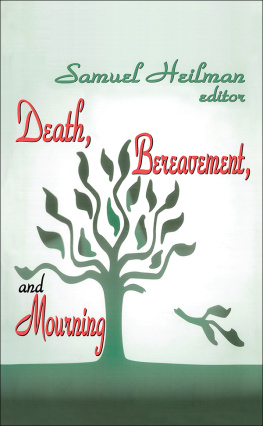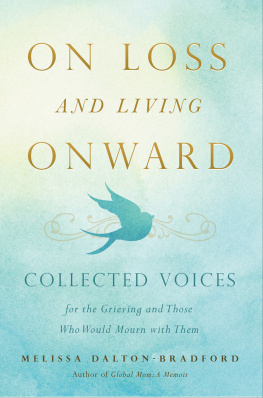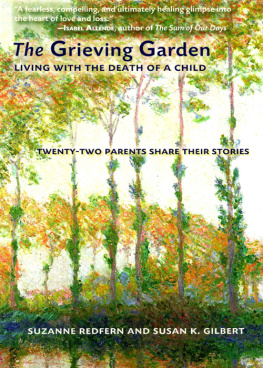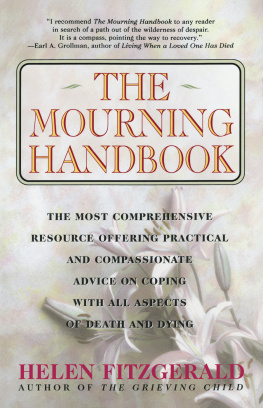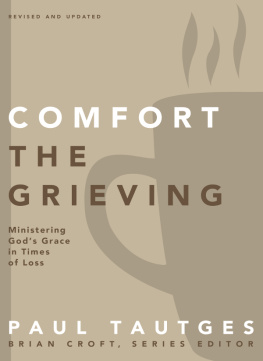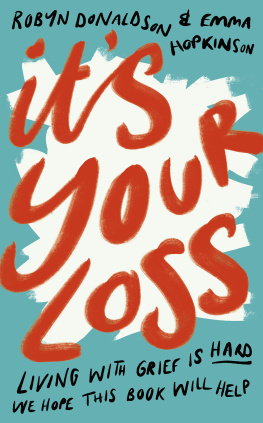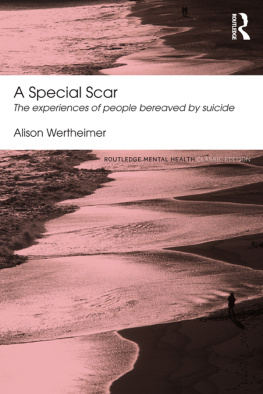First published 2005 by Transaction Publishers
Published 2017 by Routledge
2 Park Square, Milton Park, Abingdon, Oxon, 0X14 4RN
711 Third Avenue, New York, NY 10017, USA
Routledge is an imprint of the Taylor & Francis Group, an informa business
Copyright 2005 by Taylor & Francis.
All rights reserved. No part of this book may be reprinted or reproduced or utilised in any form or by any electronic, mechanical, or other means, now known or hereafter invented, including photocopying and recording, or in any information storage or retrieval system, without permission in writing from the publishers.
Notice:
Product or corporate names may be trademarks or registered trademarks, and are used only for identification and explanation without intent to infringe.
Library of Congress Catalog Number: 2004058009
Library of Congress Cataloging-in-Publication Data
Death, bereavement, and mourning / Samuel Heilman, editor.
p. cm.
Includes bibliographical references.
ISBN 0-7658-0278-3
1. DeathPsychological aspectsCongresses. 2. Bereavement Psychological aspectCongresses. I. Heilman, Samuel C.
BF789.D4D348 2005
155.937dc22 2004058009
ISBN 13: 978-0-7658-0278-1 (hbk)
To the memory of all those who died in the 9/11/2001 attacks
1
Introduction
Samuel Heilman
Faith, as anthropologist Clifford Geertz has written, sustains, cures, comforts, redresses wrongs, improves fortune, secures rewards, explains, obligates, blesses, clarifies, reconciles, regenerates, redeems, or saves, when it manages to work for those who have it. The human encounter with death is often precisely the occasion when the bereaved need to be sustained in their loss, cured of the anxiety that the meeting with death engenders, and comforted in their grief. It is a time when they often seek to redress wrongs in themselves or in the relationships that death has shaken and upset. In both the collective and individual responses to the trauma of encountering death, we discover efforts to counter the misfortune and to explain the meaning of the loss, to turn memory into blessing, to reconcile life with death, to regenerate life, and redeem or save both the bereaved, and in some ways, the dead. And often, it is the brush with death that moves those who are bereaved but have survived to take on new and often solemn obligations.
Sometimes these obligations transform the bereaved and mourning in ways that lead to growth and maturity; other times they lead to unremitting anger or melancholia. The repercussions of either of these reactions are significant for they largely shape the life for those who have survived, either for good or for bad. But in either event, the starting point is death and bereavement. This is no less true for individuals as for groups.
Given these parallels between the elements of faith and the response to death and bereavement, it is therefore no surprise that even those who have no or little contact with matters spiritual often find themselves turning to faith or something that they often call the spiritual when confronted by death that has touched them personally. Nor is it surprising to find that some scholars argue that concern with and response to death is among the primordial elements and core concerns of the spirit, and a kind of deep wellspring of religion. Religion or spiritual notions often emerge as powerful influences in the life after death. They play a part in constructing meaning out of grief, human suffering, and ultimately death. This too can lead to maturity and growth or, it can lead to obsession and a desire to fantasize. The bereaved and grief stricken look to religion to somehow solve the problem of death, to cure its cause, to defeat it. Faith can accomplish this when it leads to a belief in an afterlife or sees meaning in a life lived but lost. Yet religion can also lead to what Robert Lifton in this volume has called an apocalyptic face-off, the fear of vulnerability that a brush with death engenders and that leads to a desire to purify life by hastening the end, heaven on earth.
To be sure, there are a variety of religious or spiritual expressionssome steeped in tradition, others unique and newthat the bereaved and mourning experience in their time of loss, but there appear to be some common elements in all of them. Among these are an intensified self-awareness, a fear of or at least an anxiety about the propinquity of death and dead bodies (at its most rudimentary, a feeling that death is somehow contagious and rapacious, still hungry for more) and a sense of vulnerability. In time, these feelings, once their chaotic overtones have been stilled, also may become transformed into a growing exploration of the spiritual, a profound sense of rebirth, newfound feelings of self-mastery or confidence, and a deeply held conviction that life goes on. At the personal level, the aftermath of death often brings as well that religious experience that William James called the individual pinch of destiny, which moves the bereaved to ask the most existential of questions: Who am I? What am I supposed to do? What is to become of me? Where does finality lie?
While the answers to these questions are by no means simple or unequivocal, the asking of them is in fact an expression of and often the stimulus for even more spiritual reflection, which may in time expand and grow increasingly complex. Indeed, one often finds that the close encounter with death, the feelings of bereavement, and the process of mourning lead for some to an intensified devotion toward their own religious traditions (ironically, even among many who have otherwise become alienated from or remained ignorant of those traditions). For others, it may be expressed by a shift from no spiritual commitment to a devout spiritual life.
Most often, although surely not always, I have found that established religious traditions are the receptacles for the spiritual transformations engendered by death, bereavement, and mourning. This should not come as a surprise to students of religion; for both in so-called primitive and modern cultures, among the most widespread occasions for turning to traditional religion and ritual are the encounters with death. The way the body is disposed of, the processes of separation from the dead, and the practices of mourning to which the bereaved turn are frequently those that are time-honored, wrapped in mystery and tradition. The comfort or at the very least the spiritual and practical shelter these offer is often in their capacity to transform the chaos of death into the order of continuity. The fear of death subsides as the anxiety of bereavement gives way to the relative calm of mourning, which turns in time to a sense of renewal.
While what I have described here operates at the personal level an area that is certainly worthy of more investigationthe aftermath of the events of September 11 demonstrated that this turn to the spiritual functioned at the collective level as well. It did not matter who those who lost family members or loved ones in the disasters of that day were, the entire nation (and certainly the people of New York) were devastated. All felt bereaved; all were grief stricken. And the collective response stimulated an outpouring of spiritual expression or at the very least a public display of a turn toward spirituality. It was as if the occasion of the death and bereavement of so many at once created a mirror that forced all of those who had survived and everyone who felt touched by the loss felt like a survivorto reflect not only on the lives lived and lost but also on essential existential questions of what is most meaningful in life. Perhaps nothing more vividly articulated this than the featured obituaries in the

